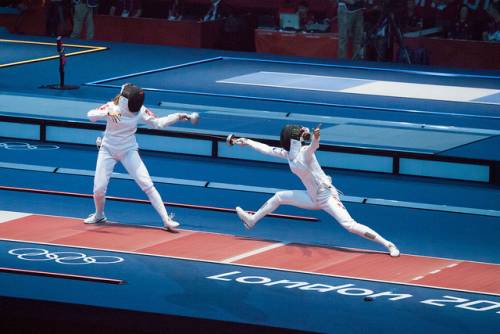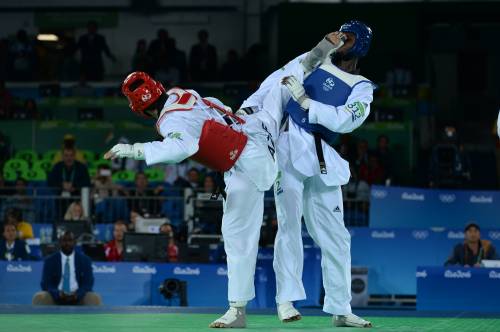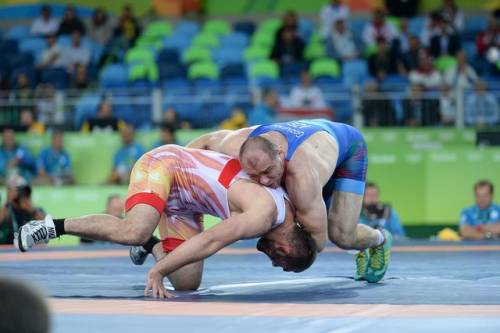Olympic Sports
Welcome back to part six of Fixture Calendar’s series looking at some of the most exciting sporting events taking place at the Paris Olympics this summer. This article will look at the always exciting combat sports. We will discuss the history, rules, and who to watch out for at the coming Games.
Paris 2024 will see the following combat sport events take place: Fencing, Judo, Taekwondo and Wrestling. Karate will not return to the Olympics this year, despite being a part of the Tokyo Games, due to it being a special event for the previous edition of the Olympics.
The first combat sport we will discuss in this article is Fencing. Fencing has been featured at every Olympic Games since the beginning of the Modern Olympic Games: the 1896 Athens Games. There are three different disciplines in Olympic Fencing, which are Foil, Épée and Sabre. Italy are the most successful nation in the history of Olympic fencing, with 130 overall medals, 49 of which are gold. France come in a close second, with 123 medals and 44 gold. At the Paris Games, the fencing events will take place at the Grand Palais strip. There will be a total of 212 fencer, distributed evenly between men and women, across 12 medal events, split between individual and team events. In the team event, teams of 3 athletes compete in a round robin against athletes from other teams to produce the overall standings and decide the medals.
Let’s have a look at the difference between the three events, the rules, and which athletes have seen success in this sport. The foil is a light weapon used for thrusting; in this event, points are scored for contact between the tip of the foil and the torso. Because the foil is light and manoeuvrable, it requires good defence and also provides offensive opportunities, making this event particularly exciting to watch. In the Men’s Individual Foil at the Tokyo Games, Hong Kong athlete Cheung Ka-long finished on the top step of the podium and claimed gold, whilst the French team won gold in the Men’s Individual Foil.
In the épée, points are scored when the tip touches any part of the body. It is heavier and less flexible than the foil, and the rules permit double touches, meaning counterattacks are more common than in other disciplines. At the Tokyo games, Sun Yiwen from China came out on top in the Women’s Individual Épée and became the first ever Chinese fencer in history to win a gold medal in this event. Estonia beat out South Korea and Italy to grab gold in the Women’s Team Épée. In the Men’s Individual Épée, French athlete Romain Cannone won gold, and looks in good form to challenge at the top again in Tokyo after achieving bronze in this event at the 2023 World Fencing Championships in Milan. Japan won the Team Épée on home soil but failed to get a medal in this event at the World Championships, with the Italian team putting in a strong performance to claim top spot and will come into the Olympics with high hopes.
The sabre sees athletes try to hit any part of the body above the waist, and contact can be made with any part of the blade, not just the tip as in épée and foil. It is perhaps the fastest of all the Olympic fencing disciplines. The female Russian athletes dominated in the Sabre events in Tokyo, claiming gold in both the Individual and Team Sabre, and claiming a silver in the Individual event. Sofia Pozdniakova won golds in both events for Russia, but after a win for Japanese Misaki Emura in the Individual Sabre at the 2023 World Fencing Championships, it is hard to call who will come out on top in Paris. Hungarian athlete Áron Szilágyi took gold home from Tokyo, whilst also leading his team to bronze in the Team Sabre, which was won by the South Korean team. With a strong performance earning them gold in the Team Sabre at the World Championships, Hungarian athletes look likely to compete at the top again this summer.
Judo was first seen at the 1964 Olympic Games in Tokyo but was then left out again until 1972 in Mexico City and has been featured in every Summer Olympics since then. Women Judoka were first allowed to compete at the Barcelona Olympic Games in 1992, after it was featured as a demonstration sport in 1988. Judo saw its first Mixed Team event at the Tokyo Games. Judo fights end when one judoka scores an “ippon” (one whole point), by scoring a throw or maintaining a pin, or the time (5 minutes for men; 4 for women) is up. Half and quarter points can also be earned, for less precise throws and shorter pins, which can be added together to produce a game-ending ippon. In the individual competition, both men and women will compete across 7 weight categories. In Tokyo, Lukáš Krpálek from the Czech Republic notably won the Men’s Heavyweight gold, after 3-time gold medal winner, Teddy Riner from France, failed to make it to the final fight, finishing third. It is hard to predict who will come out on top in any of the events, with there being so many talented judokas across all of the weight classes, but Japanese and Georgian fighters have looked strong in recent years, especially in the Men’s events.
 Taekwondo has featured at every Olympic Games since the 2000 Olympics in Sydney, but first featured as a demonstration sport in 1988 and 1992. The martial art has a focus on kicking. At the Olympics, Taekwondo sees a single elimination tournament for each weight category, of which there are four for both genders: Flyweight, Featherweight, Middleweight, and Heavyweight. The winner of the tournament wins gold, with the loser in the Final receiving silver medal. Bronze is decided by a Repechage competition, which sees anyone who loses to a finalist compete; the finalists of the Repechage each receive a gold medal. South Korea has traditionally been the dominant force in Olympic Taekwondo, winning 22 medals overall, 12 of which are gold. China, the United States, and Great Britain have all also seen success in the sport. At the Paris Olympics, Taekwondo will take place at the Grand Palais strip. In the Women’s Heavyweight Event in Tokyo, 2012 Olympic Gold winner, Milica Mandić from Serbia, retained her gold in Japan, but unfortunately will not return to defend her title after retiring after the 2020 Games.
Taekwondo has featured at every Olympic Games since the 2000 Olympics in Sydney, but first featured as a demonstration sport in 1988 and 1992. The martial art has a focus on kicking. At the Olympics, Taekwondo sees a single elimination tournament for each weight category, of which there are four for both genders: Flyweight, Featherweight, Middleweight, and Heavyweight. The winner of the tournament wins gold, with the loser in the Final receiving silver medal. Bronze is decided by a Repechage competition, which sees anyone who loses to a finalist compete; the finalists of the Repechage each receive a gold medal. South Korea has traditionally been the dominant force in Olympic Taekwondo, winning 22 medals overall, 12 of which are gold. China, the United States, and Great Britain have all also seen success in the sport. At the Paris Olympics, Taekwondo will take place at the Grand Palais strip. In the Women’s Heavyweight Event in Tokyo, 2012 Olympic Gold winner, Milica Mandić from Serbia, retained her gold in Japan, but unfortunately will not return to defend her title after retiring after the 2020 Games.
Wrestling first appeared at the first moder Olympics, held in Athens in 1896, in the form of Greco-Roman wrestling, which is one of two wrestling disciplines at the Olympic Games, the other being Freestyle wrestling, which had its first appearance in 1904 in St. Louis, but didn’t have a women’s event until 100 years later at the 2004 Athens Games. The Soviet Union top the overall medal table for all wrestling events at the Olympics, with 62 golds and 116 overall medals, but the United States have more medals overall with 138, despite having less golds. Most of the Soviet Union’s medals come from the Greco-Roman discipline, whilst the majority of the USA’s come from Freestyle. At the Paris 2024 Games, wrestling events will be held at the Grand Palais Éphémère in Champ de Mars, where 288 wrestlers will compete across 18 weight classes. Freestyle, as mentioned, has separate men’s and women’s events, whilst Greco-Roman is a male only event. In Freestyle, the entire body is a target. A wrestler wins if he manages to pin his opponent’s shoulder blades to the mat for a whole second. If this does not occur within the two rounds of 3 minutes, the match is decided on points; points are scored for takedowns, escapes, reversals, and exposures, whilst they are docked for fouls, passivity and leaving the circle. In Tokyo, Japanese athletes won four out six of the Women’s Freestyle events, and another gold in the Men’s 65kg Event.
In Greco-Roman, the legs are not a legal target, and wrestlers may only attack - and attack with - their upper body. As in freestyle wrestling, a wrestler immediately wins if he manages to pin his opponent’s shoulder blades for a whole second, and points are scored in the same manner. However, it is the first wrestler to win two rounds, rather than the total number of points which decides the winner. Cuba won two golds in the Men’s Greco-Roman events, the most notable of which was Mijaín López winning his fourth Olympic gold medal and didn’t lose a single point in the tournament. He is the only male to win four Olympic Gold medals in wrestling.
Combat sports combine strength, speed, and technique to create a spectacle that even the most casual of viewers can get excited about, and it is definitely worth checking them out this summer.
This year’s Summer Olympics will take place from 26 July to 11 August in Paris, France. You can easily keep up-to-date and stay informed on every combat sports event happening at Paris 2024 by creating a Fixture Calendar account or downloading our App.
Why not also check out our This Week in Sport blog, for a rundown or the top sporting events happening each week or get a useful overview of the 15 most exciting events taking place each month with our Fixture Calendar newsletter here.
Harry Stephens, May 2024
Photos by Tom Page, Ilgar Jafarov